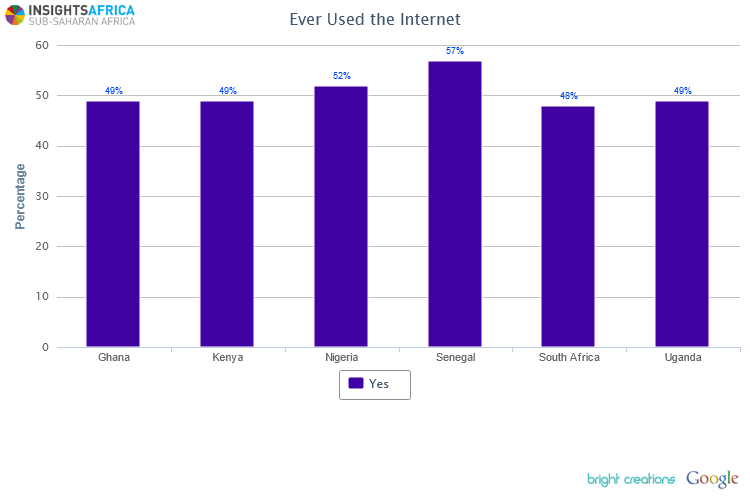No surprises from Google’s ‘Insights Africa: Internet Usage’ statistics
Yesterday, Google, in a partnership with Basis Research Ltd, released an interactive data set based on survey data from 2010 and 2011. Google explained the basics behind the methodology on their Google Africa Blog:
We interviewed over 13,000 people in urban centres of 6 key African countries – Ghana, Kenya, Nigeria, Senegal, South Africa and Uganda – to understand how and why people use the internet, what prevents non-users from coming online, and much more.”
None of the findings are groundbreaking, but they are extremely interesting, nonetheless. The presentation of the data and ease of access are top-notch. Filters for country, age, gender, and user-status, along with multiple layout options are simple, yet powerful. As is the ability to export in .xls, .csv, .png, and .pptx file formats. Hopefully the inviting layout and colors can attract those new to African Internet data to have a look at a snapshot of African Internet usage habits. This seems to be the main goal of the project.
Like TechZim, we wish there were more countries with survey data, especially considering how Google markets the resource as “Insights Africa: Sub-Saharan Africa”. The real title should be “Insights Africa: South Africa, Kenya, Nigeria, Ghana, Senegal, Uganda”.
One other point worth noting is the relevancy of data. These days, a survey becomes outdated the day it is conducted. In this case, half of the survey data is from 2010; the other half is nearly a year old. Any data is better than no data, but keep in mind some of the trends (ie. how long ago a user first started using the Internet) are based on an Internet scene from two years ago.

Share of survey respondents from 6 countries who had used the Internet as of 2010/2011. {Insights Africa}
High-level trends (not filtered by gender or age)
- Cyber cafe was most common connection location for all except South Africa
- ~50% have ever used the Internet in all countries
- Roughly two-fifths of that group started using the Internet 2+ years ago
- Nearly all respondents who use the Internet were using it more than a year ago
- Future interest in using the Internet was mixed in all nations except Nigeria where there is definite interest
- The computer was found to be the most common point of access (as opposed to mobile). This trend was especially strong in Senegal. South Africa was split between computer and mobile
- Lower cost was cited as the most popular driver for increased usage. The other options (faster, easier access, more knowledge, more reliable, more relevant content) were spread out
- Non-users generally wanted more knowledge and lower cost. In Kenya, however, non-users desired more relevant content and easier access
- Non-user barriers to Internet usage were more spread out, generally among knowledge, lack of interest/time, and connection/access. Content was less of a concern
- The average Internet session length for computer users was generally 31 minutes to 2 hours
- On mobile, an average session lasting 5-30 minutes was most common
- The most popular online activities were entertainment and news
- Non-users had good awareness about what online activities are available and were most interested in email
- A minority of users accessed a computer more than once per day, but most users accessed a mobile device more than once per day
- In Ghana, Senegal, and Uganda, roughly 40% of computer users were ‘not comfortable at all‘ with using a computer. ~25% were ‘very comfortable’ with one
- 84-97% owned a mobile (highest in Nigeria, lowest in Uganda)
- Senegalese respondents sent more SMS messages per day than Ghana and Uganda
Again, kudos to Google and to Basis for making the data so accessible.












 Twitter
Twitter Facebook
Facebook Pinterest
Pinterest